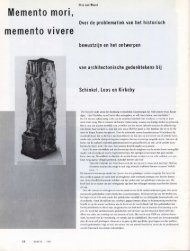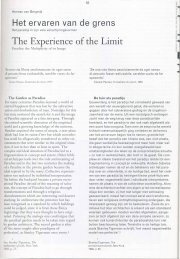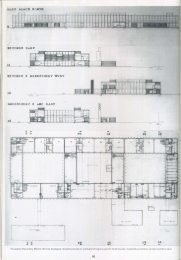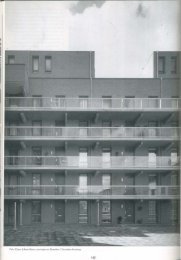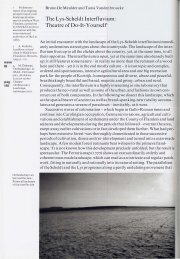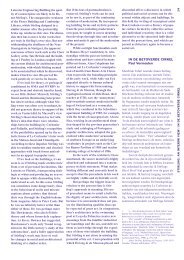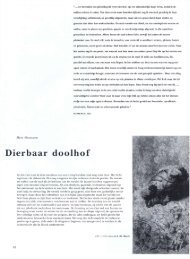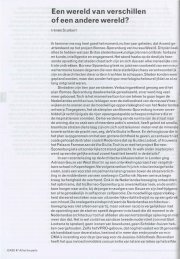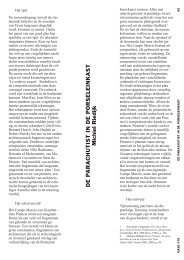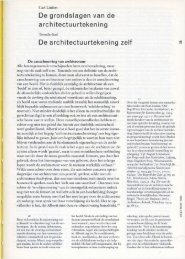Download PDF, 11 pagina's, 4,77 MB - OASE Journal for Architecture
Download PDF, 11 pagina's, 4,77 MB - OASE Journal for Architecture
Download PDF, 11 pagina's, 4,77 MB - OASE Journal for Architecture
Create successful ePaper yourself
Turn your PDF publications into a flip-book with our unique Google optimized e-Paper software.
The utility of the garden need not be discussed<br />
much further. It should be enough to invoke the<br />
fundamentally functional origins of the garden<br />
throughout world history to secure useful plants a<br />
place of honour in the garden of the future. But it is<br />
not just the body but also the mind that is nourished<br />
by the fruit, which has not accidentally served as a<br />
legendary device since the Garden of Eden. Since<br />
then, the satisfaction of one's physical needs has<br />
always been sacrosanct, or at least should have been.<br />
And in the same way that the satisfaction of these<br />
needs, when taken to the point of excess, has always<br />
degenerated into extravagance, the seed of degenera<br />
tion was sown in the garden the moment it began to<br />
distance itself from its natural origin: simple fertility.<br />
Whoever or whatever was it, in ancient Egypt, in the<br />
Orient or during the Middle Ages, who caused this<br />
unhappy divorce between the vegetable garden and<br />
the ornamental garden, or even the complete<br />
elimination of the <strong>for</strong>mer? It is not very likely that<br />
this separation was made to enhance the beauty of<br />
the garden, and it has certainly damaged the life<br />
of the garden.<br />
We, the people of today, have no cause what<br />
soever to disregard or degrade what is useful in our<br />
gardens. We should not doubt the utility of the<br />
garden and its fruits any more than we do the utility<br />
of cemeteries or the uses of the garden <strong>for</strong> pleasure<br />
or play. Indeed, in an era of economic decline, we as<br />
Europeans have every reason to devote much greater<br />
86<br />
ereplaats volstaat het te verwijzen naar de rationele<br />
oorsprong van de tuin overal ter wereld. Maar niet<br />
aileen het I ichaam, ook de geest eet van de vrucht, die<br />
niet voor niets al in het paradijs een legendarische rol<br />
speelde. Bovendien is de bevrediging van de lichame<br />
lijke behoeften op aarde altijd iets heiligs geweest,<br />
of had dat in ieder geval moeten zijn. En zoals deze<br />
behoefte, lichtvaardig overschreden, telkens weer<br />
ontaardde in destructieve luxe, zo droeg ook de tuin de<br />
kiem van de degeneratie in zich vanaf het moment dat<br />
hij zich ging verwijderen van zijn natuurlijke oorsprong:<br />
simpele vruchtbaarheid. Wie of wat heeft toch in het<br />
oude Egypte, in de Orient of in de Middeleeuwen die<br />
noodlottige scheiding aangebracht tussen de nutstuin<br />
en de siertuin of zelfs de eerste compleet afgeschaft!<br />
Het valt niet aan te nemen dat de schoonheid van<br />
tuinen gediend was met deze scheiding, en voor het<br />
Ieven in de tuin zelf was zij zeker schadelijk.<br />
Vandaag de dag hebben wij niet de minste reden het<br />
nuttige in een tuin te negeren of te geringschatten.<br />
Zoals wij het nut van een kerkhof als vanzelf inzien,<br />
zoals we de tuin vanzelfsprekend gebruiken voor spel<br />
en wonen, zo moeten we ook het belang van de vrucht<br />
van de tuin onderkennen. Er is voor ons, economisch<br />
verzwakte Europeanen, zelfs aile reden om meer en<br />
bl ijvende aandacht te schenken a an de opbrengst van<br />
de kleine stukjes grond, onze miljoenen tuinen, zoals ik<br />
reeds in mijn boek Deutsche Binnenko/onisation naar<br />
voren bracht. De tuin van de toekomst mag zijn karak<br />
ter best in essentie aan de utiliteitsgedachte ontlenen.



